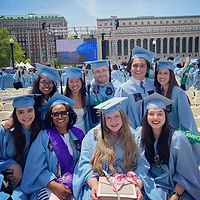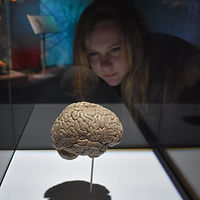MELISSA J. COFFEL


My research interests lie at the intersection of cognitive and affective neuroscience, clinical psychology, and digital mental health. I use multimodal methods, including EEG/ERP, fMRI, EMG, neuropsychological testing, behavioral tasks, self-report measures, and digital mental health modalities to examine neurocognitive and affective processes underlying anxiety, depression, anhedonia, psychosis-spectrum disorders, and other chronic health conditions. My goal is to apply translational and implementation science to identify individuals at elevated clinical risk and to develop, refine, and scale interventions that are effective, accessible, and sustainable in real-world care settings.

Education

Columbia University
Master of Science
Neuroscience & Education
I completed my MS in Neuroscience and Education at Teachers College, Columbia University, where I was advised by Dr. Kay James and Dr. Kimberly Noble.
Thesis: "From Brain and Behavior to Machine: Advancing Neuroimaging and Neuropsychological Diagnostic Tools with Machine Learning-Assisted Prediction of Dyscalculia"

University of Illinois at Urbana-Champaign
Bachelor of Science
Psychology
I completed my BS in Psychology with a formal concentration in Behavioral Neuroscience at the University of Illinois at Urbana-Champaign, where I was advised by Dr. Kiel Christianson and Dr. Kara Federmeier.

Research Experience
University of North Carolina at Chapel Hill
I recently joined Dr. Aysenil Belger’s Neurocognition and Imaging Research Lab, where I support innovative neuroimaging research focused on identifying neural mechanisms underlying psychiatric disorders. I contribute to cross-disciplinary projects that integrate cognitive neuroscience, computational approaches, and clinical psychology to advance early detection and intervention strategies. The work I contribute to centers on investigating neurocognitive processes in adolescents and adults with familial risk for psychosis-spectrum conditions, as well as individuals experiencing anhedonia and anxiety.
PI: Dr. Saif Khairat
I served as the sole Center and Research Project Manager for the NIH/NCATS and NCTraCS $3.73 million funded Center for Virtual Care Value and Excellence (ViVE) at UNC Chapel Hill, the first center nationwide dedicated to advancing equitable virtual care. I managed all center and research operations, including NIH study lifecycles, team recruitment and mentorship, stakeholder and national partnership engagement, and data analytics oversight to support equity-focused decision-making. I also authored peer-reviewed studies using quantitative and qualitative methods, contributed to grant writing and national conference presentations, and represented ViVE on national platforms to advance the field of digital health innovation.
Yale University School of Medicine
In the Yale Schizophrenia Research Program at the Yale School of Medicine, I worked as a Clinical Research Analyst, contributing to clinical and translational studies aimed at identifying neural biomarkers of schizophrenia and psychosis-spectrum disorders, specifically auditory hallucination symptoms. In this role, I conducted EEG, MEG, and concurrent EEG/EMG research examining neural dysfunction during cognitive and sensorimotor tasks.
Columbia University
PI: Dr. Peter Gordon
In the Language and Cognitive Neuroscience Lab at Teachers College, Columbia University, I contributed to projects using EEG/ERPs and eye tracking to examine semantic and associative priming effects on cognition in both neurotypical and clinical groups. This work included research on visual perceptual organization in individuals with schizophrenia and neurotypical populations. I also supported the EEG Numbers Project, which investigates numerical cognition in children and the Pirahã people.
PI: Dr. Kay James
In the Neurocognition of Language Lab at Teachers College, Columbia University, I contributed to research on semantic depth of processing in digital versus print reading, as indexed by the N400 ERP. I presented this work on behalf of the lab at the 2021 Cognitive Neuroscience Society annual conference.
University of Illinois at Urbana-Champaign and the Beckman Institute for Advanced Science and Technology
I served in dual roles as a research assistant and laboratory manager in the Cognition and Brain Lab, where I contributed to a wide range of psycholinguistic and cognitive neuroscience studies. My work involved using EEG/ERP, eye tracking, and pupillometry to investigate word expectancy and the N400, foveal semantic load, parafoveal processing during reading, and language comprehension indexed by the N400, P300, and P600. I also supported projects that integrated concurrent ERP/eye tracking/pupillometry to examine real-time language comprehension and memory during self-paced reading, gaining extensive experience in multimodal experimental design, data collection, and preprocessing.
My introduction to research began in the Educational Psychology Psycholinguistics Lab, where I conducted eye tracking studies examining psycholinguistic influences on reading, cognition, and second-language acquisition in both children and adults. This work investigated reading comprehension differences between monolingual English speakers and bilingual speakers whose native languages included Mandarin, Korean, Russian, and Arabic, providing experience with cross-linguistic research and cognitive processing during reading.
Cognition
Emotion
Intervention
Outcome


